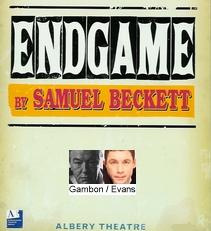Endgame - Albery Theatre 2004
Imagine you have survived a holocaust, possibly nuclear, and your world is suddenly reduced to a small dirty room, in which you sit chair bound, blind and bored. Your only deliverance from this interminable monotony is the company of your ageing, legless parents, who live in garbage bins and a foolish limping servant, who is at your beck and call, and who like a dog comes when whistled for. This is the helpless world of Hamm, his parents Nell and Nagg, and his servant Clov.
Beckett is far from an easy playwright, and his almost obsessive pessimistic view of life's meaningless finds ample expression in his writing. What makes Endgame particularly taxing is the total lack of optimism, which can be found in many of his other plays. In Beckett's 'Happy Days' the unfortunate Winnie bravely reassures herself "It could be worse", however in Endgame the characters know that it could not possibly be worse. "Good as nothing, is that possible?" asks Clov. And indeed, it seems that nothing would be better than their wretched existence.
The sheer misery of the play paradoxically does allow a few glimmers of humour, "Nothing is funnier than unhappiness" counsels Nell, Hamm's mother. And in an eerie way, this proves true. Learning that his father Nagg is weeping over the death of Nell, Hamm comments, "If he's weeping, he must be alive". When Hamm next enquires about his father's activity, Clov tells him "He is sucking his biscuit", to which Hamm responds, "Life goes on!"
Matthew Warchus' production focuses on these paradoxical elements. The play begins with a roll of drums as if one is about to witness a spectacle, which is surely what we all expect life to be, only for the curtains to raise and a shabby, lame Clov, to totter on stage and look around wholly bemused. "Finished, it's finished, nearly finished, it must be nearly finished", he states, as he begins yet another pointless day. Then we witness a Charlie Chaplin type comedy sketch, as Clov climbs the stepladders with which to reach the windows in order to draw back the curtains. This is surely one of the reasons the supple -limbed comedian Lee Evans has been chosen for the part of Cloy.
Lee Evans gives an incredible performance as Clov. I have never cared for his physical humour, and so the opening scene with the stepladders was totally lost on me. However, he does capture the pain of Clov's existence. I could feel servitude rancour at his soul as he ponders why he always responds to Hamm's whistle and incessant demands.
Michael Gambon dominates the stage as Hamm. Though Gambon's eyes remain hidden behind dark glasses, his voice is able to capture each of Hamm's emotions, whether he is barking orders or meekly supplicating for a sign of affection. When Clov pushes Hamm towards the window, one can feel his bitterness with life as he bemoans "There already?" Gambon's fingers are almost as expressive as his voice, as they twitch with agitation as the tedious day continues in its usual way.
Beckett's Endgame is terribly morbid, and I suspect that I may not be the only one answering Clov's rhetorical question "Good as nothing, is that possible?" with an unequivocal Yes!
What other critics had to say.....
NICK CURTIS for THE EVENING STANDARD says, "Laughter amid the despair as Gambon triumphs." MICHAEL BILLINGTON for THE GUARDIAN says, "Centre-stage sits Gambon's magnificent Hamm, which evokes multiple images: a screaming Bacon Pope, a dying Prospero, a decaying Irish landlord." PAUL TAYLOR for THE INDEPENDENT says, "A stunningly good production that derives its power from the inspired pairing of comedian Evans with Michael Gambon". CHARLES SPENCER for THE DAILY TELEGRAPH says, "Michael Gambon...and Lee Evans....create a tremendous double act."
External links to full reviews from popular press
The Independent
The Guardian
Daily Telegraph
Originally published on
